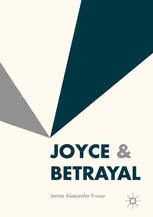
Joyce & Betrayal PDF
Preview Joyce & Betrayal
Joyce & Betrayal JamesAlexanderFraser Joyce & Betrayal JamesAlexanderFraser UniversityofExeter Exeter,UK ISBN978-1-137-59587-4 ISBN978-1-137-59588-1(eBook) DOI10.1057/978-1-137-59588-1 LibraryofCongressControlNumber:2016948829 ©TheEditor(s)(ifapplicable)andTheAuthor(s)2016 Theauthor(s)has/haveassertedtheirright(s)tobeidentifiedastheauthor(s)ofthisworkin accordancewiththeCopyright,DesignsandPatentsAct1988. This work is subject to copyright. All rights are solely and exclusively licensed by the Publisher,whetherthewholeorpartofthematerialisconcerned,specificallytherightsof translation, reprinting, reuse of illustrations, recitation, broadcasting, reproduction on microfilms or in any other physical way, and transmission or information storage and retrieval,electronicadaptation,computersoftware,orbysimilarordissimilarmethodology nowknownorhereafterdeveloped. Theuseofgeneraldescriptivenames,registerednames,trademarks,servicemarks,etc.inthis publicationdoesnotimply,evenintheabsenceofaspecificstatement,thatsuchnamesare exemptfromtherelevantprotectivelawsandregulationsandthereforefreeforgeneraluse. Thepublisher,theauthorsandtheeditorsaresafetoassumethattheadviceandinformation in this book are believed to be true and accurate at the date of publication. Neither the publishernortheauthorsortheeditorsgiveawarranty,expressorimplied,withrespectto thematerialcontainedhereinorforanyerrorsoromissionsthatmayhavebeenmade. Printedonacid-freepaper ThisPalgraveMacmillanimprintispublishedbySpringerNature TheregisteredcompanyisMacmillanPublishersLtd. The registered company address is: The Campus, 4 Crinan Street, London, N1 9XW, UnitedKingdom A CKNOWLEDGEMENTS I will begin by thanking the University of York, who not only supported methroughoutmyPhDstudy,butprovidedmewitharich,exciting,and challenging research community of academics and postgraduates within which to develop my ideas. Special thanks must go to Derek Attridge whose support of this project has always been enthusiastic and attentive. The very model of a doctoral supervisor, I will always be grateful for his patient, probing questions and for the warm encouragement that has continued beyond my graduate degree. Thanks must also go to Hugh Haughton, whose critical commentary on my work was always provoca- tive,nuanced, andjust. I’d further like to thank the British Association of Irish Studies (BAIS) for their generous award of a subsistence grant at a crucial time in my graduate study; Modernism/modernity—and in particular Lawrence Rainey—for trusting me with editorial power over the leading journal in the field of modernist studies; and my colleagues at the University of Cambridge and University of East Anglia, who have offered me support andguidance overthe last two years. There are many more people without whom this book may not have come into being; many more without whom the book may have existed, but in aseverely depleted form;and more againwithoutwhom the book mayhavethrived,butattheexpenseofmymentalwell-being.Mythanks first of all to the “Gang.” Thanks for keeping me fit in body and mind. I offermythankstobothmyparents,fromwhomIreceivedwhatevershare ofbrainsIhave,andtomymotherinparticularforhavingnoambitionfor herchildren butthatthey should go asfar astheycould. v vi ACKNOWLEDGEMENTS My thanks go finally to Anna: funding body, best friend, proofreader (improving all the time), and life-long companion. Thanks for sticking withme.IcansaywithabsolutecertaintythatIcouldnothavedonethis withoutyou; nor wouldI havewantedto. C ONTENTS 1 Introduction 1 2 WritingDrama, WritingBetrayal: Joyce’s Triestine Non-Fiction 37 3 “Boyhood” as“Death”: Betrayalin APortrait ofthe Artist asa Young Man 57 4 “A nationexacts apenance”: Platonic Betrayal andHeroic Return in Exiles 81 5 “Like thieves inthe night”: SexualBetrayal asDispossession inExiles 103 6 Betrayal, Stagnation,andthe Family Romantic in Ulysses 133 7 BetrayingBloom 153 8 SexualBetrayal in“Penelope” 175 vii viii CONTENTS Coda 197 Bibliography 199 Index 207 CHAPTER1 Introduction BETRAYAL: THE GREAT DONNÉE OF JOYCE STUDIES Even the most cursory reader of James Joyce is likely to pick up on his interest inbetrayal. After all,thisis far fromasilentpresence in hiswork, from Dubliners through to Finnegans Wake. Yet while his more com- mitted readers—the writers and critics who have contributed to the already monumental body of commentary and exegesis that has built up overthelastcentury—havesimilarlyacknowledgedthisinterest,therehas beenrelativelylittleattempttoexplainitcritically.Itisforthisreasonthat IsuggestthatbetrayalisoneofthegreatdonnéesofJoyceancriticism.It hasbecomea“given”inthemostproblematicofsenses—somuchofthe work that has been done on Joyce’s oeuvre over the last century has placed at or near its centre the assumption that Joyce was “obsessed” with betrayal. When James Fairhall suggested, in 1995, that “the theme ofbetrayalrunsthroughoutJoyce’swritings,”hedidsowiththeapparent certainty of someone not so much stating a position as acknowledging a fact.1Theideawasanoldone35yearsearlier,whenWilliamYorkTindall, with a similar sense of treading on old ground, suggested that “betrayal...was one of Joyce’s central themes.”2 Neil Davison, shortly afterFairhall,displayedthecuriousmixofinsistenceanduneasethatcrops up time and again in discussions of Joycean betrayal: “The very idea of betrayal,”Davisonsuggests,“became,ofcourse,apreoccupationofJoyce’s adultlife”—the“ofcourse”issignificant.3Itseemsthatbythemid-1990s (if not earlier), it was no longer acceptable to speak of betrayal in Joyce’s ©TheAuthor(s)2016 1 J.A.Fraser,Joyce&Betrayal,DOI10.1057/978-1-137-59588-1_1 2 JOYCE&BETRAYAL workwithoutapologizingtothereaderforwhatwas,thewriterwaskeen to stress, a digression into “well-known” territory. This deferral of argu- mentationisimportant,sincewhileitisrarelymadecleartowhatseminal, conclusive critical study we owe this knowledge (that Joyce was obsessed bybetrayal),weareencouragedtoseeitasamattermoreorlessclosedfor discussion. The work has already been done, but it’s never quite clear precisely where or precisely when. What we can say with certainty, it seems,isthatitwasdonelongenoughagoastobecommonknowledge. Since the reader is assumed to know everything there is to know on this subject,then,itisseenasbestforthecritictomoveonquicklytomatters that are seen as more novel and, therefore, more worthy of critics’ and readers’time.Thisbookis,inasense,anattempttoreversethistrend,to draw attention to Joycean betrayal while making no apologies for doing so: for choosing to linger on its intricacies and its indeterminacies, to unravel the significance of a topic that has been seen, paradoxically, to be toocentralto Joyce’s thoughttobe worthyof furtherstudy. The complacency within Joycean studies on this issue is evident from the language that has been adopted to discuss it. While Tindall’s sugges- tion that betrayal was one of Joyce’s “central themes” leaves open the question of what this centrality might mean, he also makes use of a quite different, more problematic register: “[B]etrayal, [is] one of the most evident [themes] in Exiles, and if we may judge by its presence in A Portrait and Ulysses, one of Joyce’s obsessions.”4 Davison, after speaking more coyly about Joyce’s “preoccupation” also describes it as an “obses- sion.”5 The linguistic shift that occurs here is telling, since both “preoc- cupation”and“obsession,”ratherthanofferanexplanationordescription of Joycean betrayal, attempt instead to pathologize it. When we speak of prevailingmotifsand“centralthemes”wearespeakingofapredominately volitionalinterest,but“obsession”suggeststhatthisinterestissoextreme intypeand/orextentthatitmovesbeyondthenormalrangeofexplicable action. In using the language of compulsion, we tacitly accept that this aspectofJoyce’swritingis,fundamentally,inaccessibletoanalysis(except, perhaps, psychoanalysis). There have certainly been (problematic) attempts to analyse Joyce as a product of his “obsession” with betrayal,6 butmorecommonlythispathologizationmerelyallowsforbetrayaltobe set aside altogether. Once we have acknowledged its importance, we can safelyignoreit.Thequestionofthehow,why,andwhatforisansweredby itsowncircularlogic:Joycewritesaboutbetrayalbecauseheisobsessedby betrayal, he is obsessed by betrayal because...The only possible
